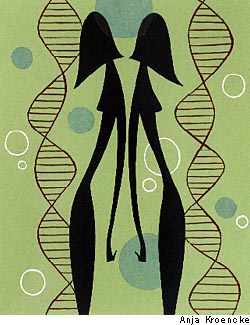
While the cultural standards of some Western societies may encourage women to starve themselves in order to conform to ideals of feminine beauty, some women also appear to have a genetic predisposition to do so. In a recent study of anorexic twins, Dr. Wade Berrettini, director of Penn’s Center for Neurobiology and Behavior, found that both members of pairs of identical twin sisters were much more likely to suffer from anorexia nervosa than were both members of a pair of fraternal twin sisters. And immediate family members of anorexic women were 10 times more likely to become anorexic than members of the general population.
“Certainly environmental ideals of feminine beauty influence the risk for this disorder,” says Berrettini. “But we should remember that there were common and multiple descriptions of anorexia nervosa dating back to the 17th and 18th centuries, when a more rococo image of feminine beauty prevailed.” And the studies of twins and families, he notes, “suggest that about half the risk of developing this eating disorder is inherited.”
Berrettini, whose findings were published in the winter issue of Directions in Psychiatry, has been working with a “consortium of investigators” in the United States and Germany. One group was headed by Dr. Walter Kaye of the University of Pittsburgh, who has collected blood samples from some 200 families in which at least two siblings have anorexia or bulimia nervosa. Berrettini’s team at Penn has been analyzing the DNA from those samples to identify the genetic factors underlying anorexia, which has been defined as a refusal to ingest enough food to maintain 85 percent or more of normal body weight, an irrational fear of obesity, and a distorted body image that one is overweight even when emaciated.
“It’s certain that there are multiple genes that contribute to anorexia-nervosa susceptibility,” says Berrettini. “It will take another six months to find out where a few of them are located on the human genome.” Several years ago, Berrettini discovered a gene that increases the risk of manic depression.
Since the available treatments for anorexia have shown limited effectiveness on a long-term basis, Berrettini says: “It’s our hope that if we can find susceptibility genes, we will then be able to develop better treatments for the disorder.” In the meantime, he and the consortium are conducting a “parallel study” of people with bulimia.

